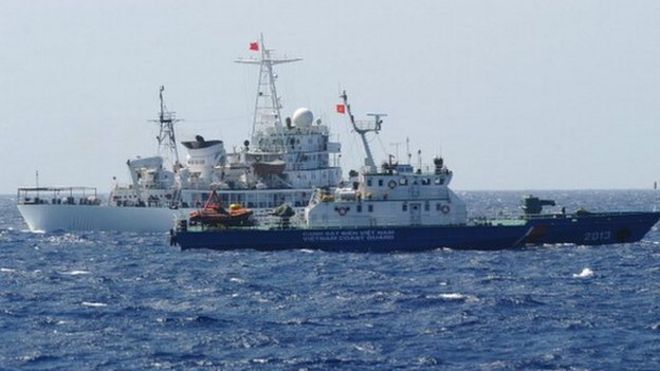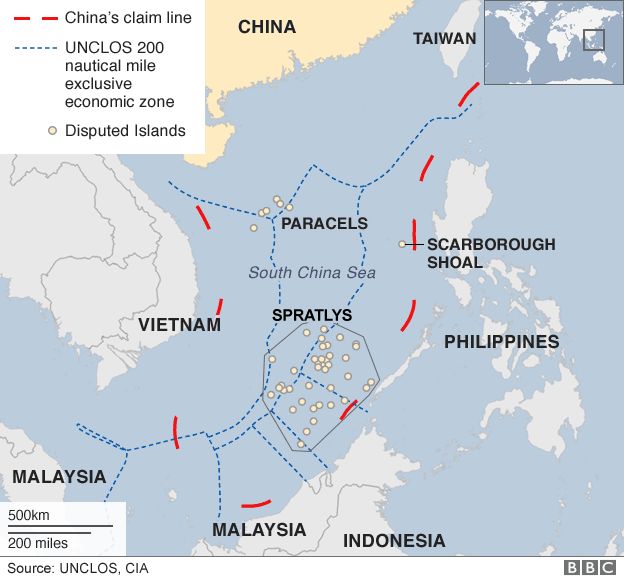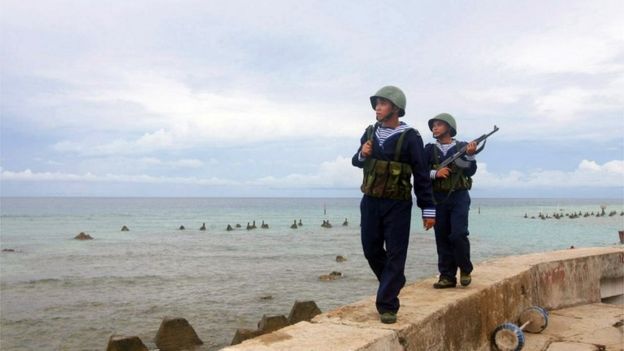Vietnam's capitulation shows China's neighbors fear the U.S. no longer has their backs.BY BILL HAYTON

Vietnam’s history is full of heroic tales of resistance to China.
But this month Hanoi bent the knee to Beijing, humiliated in a contest over who controls the South China Sea, the most disputed waterway in the world.
Hanoi has been looking to Washington for implicit backing to see off Beijing’s threats.
At the same time, the Trump administration demonstrated that it does not understand and sufficiently care about the interests of its friends and potential partners in Southeast Asia to protect them against China.
Southeast Asian governments will conclude that the United States does not have their backs.
And while Washington eats itself over Russian spies and health care debates, one of the world’s most crucial regions is slipping into Beijing’s hands.
There’s no tenser set of waters in the world than the South China Sea.
For the last few years, China and its neighbors have been bluffing, threatening, cajoling, and suing for control of its resources.
In June, Vietnam made an assertive move.
After two and a half years of delay, it finally granted Talisman Vietnam (a subsidiary of the Spanish energy firm Repsol) permission to drill for gas at the very edge of Hanoi’s exclusive economic zone (EEZ) in the South China Sea.
Under mainstream interpretations of the U.N. Convention on the Law of the Sea (UNCLOS), Vietnam was well within its rights to do so.
Under China’s idiosyncratic interpretation, it was not.
China has never even put forward a clear claim to that piece of seabed.
On July 25, Chinese Foreign Ministry spokesman Lu Kang would only
urge “the relevant party to cease the relevant unilateral infringing activities” — but without saying what they actually were.
In the absence of official clarity, Chinese lawyers and official think tanks have suggested two main interpretations.
China may be claiming “historic rights” to this part of the sea on the grounds that it has always been part of the Chinese domain (something obviously contested by all the other South China Sea claimants, as well as neutral historians).
Alternatively, it may be claiming that the Spratly Islands — the collection of islets, reefs, and rocks off the coasts of Vietnam, Malaysia, Brunei, and the Philippines — are entitled as a group to their own EEZ.
An international arbitration tribunal in The Hague, however, ruled these claims incompatible with UNCLOS a year ago.
China has refused to recognize both the tribunal and its ruling.
In mid-June, Talisman Vietnam set out to drill a deepwater “appraisal well” in Block 136-03 on what insiders believe is a billion-dollar gas field, only 50 miles from an existing Repsol operation.
The Vietnamese government knew there was a risk that China might try to interfere and sent out coast guard ships and other apparently civilian vessels to protect the drillship.
At first, China’s intervention was relatively diplomatic.
The vice chairman of the Central Military Commission, Gen. Fan Changlong, visited Hanoi on June 18 and demanded an end to the drilling.
When Vietnam refused, he cancelled a joint meeting on border security (the 4th Border Defense Friendly Exchange) and went home.
Reports from Hanoi (which have been confirmed by
similar reports, from different sources, to the Australia-based analyst
Carlyle Thayer) say that, shortly afterward, the Vietnamese ambassador in Beijing was summoned to the Chinese Foreign Ministry and told, bluntly, that
unless the drilling stopped and Vietnam promised never to drill in that part of the sea ever again, China would take military action against Vietnamese bases in the South China Sea.This is a dramatic threat, but it is not unprecedented.
While researching my book on the South China Sea, I was told by a former BP executive that China had made similar threats to that company when it was operating off the coast of Vietnam in early 2007.
Fu Ying, then the Chinese ambassador in London, told BP’s CEO at the time, Tony Hayward, that she could not guarantee the safety of BP employees if the company did not abandon its operations in the South China Sea.
BP immediately agreed and over the following months withdrew from its offshore Vietnam operations.
I asked Fu about this at a dinner in Beijing in 2014, and she replied, “I did what I did because I have great respect for BP and did not want it to get into trouble.”
Vietnam occupies around 28 outposts in the Spratly Islands.
Some are established on natural islands, but many are isolated blockhouses on remote reefs. According to Thayer, 15 are simply platforms on legs: more like place markers than military installations.
They would be all but impossible to defend from a serious attack.
China demonstrated this with attacks on Vietnamese positions in the Paracel Islands in 1974 and in a battle over Johnson South Reef in the Spratlys in 1988.
Both incidents ended with casualties for Vietnam and territorial gains for China.
There are rumors, entirely unconfirmed, that there was a shooting incident near one of these platforms in June.
If true, this may have been a more serious warning from Beijing to Hanoi.
Meanwhile, the drillship Deepsea Metro I had found exactly what Repsol was looking for: a handsome discovery — mainly gas but with some oil.
The company thought there could be more and kept on drilling.
It hoped to reach the designated total depth of the well by the end of July.
Back in Hanoi, the Politburo met to discuss what to do.
Low oil prices and declining production from the country’s existing offshore fields were hurting the government budget.
The country needed cheap energy to fuel its economic growth and keep the Communist Party in power — but, at the same time, it was deeply dependent on trade with China.
It is all but impossible to know for sure how big decisions are made in Vietnam, but the version apparently told to Repsol was that the Politburo was deeply split.
Of its 19 members, 17 favored calling China’s bluff.
Only two disagreed, but they were the most influential figures at the table: the general secretary of the party, Nguyen Phu Trong, and Defense Minister Ngo Xuan Lich.
After two acrimonious meetings in mid-July, the decision was made: Vietnam would kowtow to Beijing and end the drilling.
According to the same sources, the winning argument was that the Trump administration could not be relied upon to come to Hanoi’s assistance in the event of a confrontation with China.
Reportedly, the mood was rueful.
If Hillary Clinton had been sitting in the White House, Repsol executives were apparently told, she would have understood the stakes and everything would have been different.
The faith in Clinton isn’t surprising.
Her interventions on behalf of the Southeast Asian claimant states, starting in Hanoi at the
July 2010 meeting of the ASEAN Regional Forum, are well remembered in the region.
The
Barack Obama administration’s focus on the regional rules-based order was
welcomed by governments fearful of domination by either the United States or China.
That said, some U.S. observers are skeptical that any other administration would have been more forthcoming.
Bonnie Glaser, the director of the China Power Project at the Center for Strategic and International Studies, questions this apparent contrast: “What would the U.S. have done differently [under Obama]? I find it unlikely that the U.S. would militarily defend Vietnam against China. Vietnam isn’t an ally.”
Yet it wouldn’t have taken much: a statement or two about the rules-based order and the importance of abiding by UNCLOS, some coincidental naval exercises during the weeks of the drilling, perhaps even some gunnery practice in the region of Block 136-03 and a few quiet words between Washington and Beijing.
“Forward-deployed diplomacy,” as it used to be called.
The Obama administration
warned Beijing off the Scarborough Shoal in April 2016 this way.
Has Donald Trump’s Washington forgotten the dark art of deterrence?
The implications of China’s victory are obvious.
Regardless of international law, China is going to set the rules in the South China Sea.
It is going to apply its own version of history, its own version of “shared” ownership, and it will dictate who can exploit which resources.
If Vietnam, which has at least the beginnings of a credible naval deterrent, can be intimidated, then so can every other country in the region, not least the Philippines.This month, Manila
announced its intention to drill for the potentially huge gas field that lies under the Reed Bank in the South China Sea.
The desire to exploit those reserves (before the country’s main gas field at Malampaya runs out in a few years’ time) was the main reason for the Philippines to initiate the arbitration proceedings in The Hague.
The Philippines won a near total legal victory in that case, but since taking office just over a year ago, Rodrigo Duterte has downplayed its importance.
He appears to have been intimidated: preferring to appeal to China for financial aid rather than assert his country’s maritime claims.
In May, Duterte
told an audience in Manila that
Xi Jinping had warned him there would be war if the Philippines tried to exploit the gas reserves that the Hague tribunal had ruled belonged to his country. Last week, Chinese Foreign Minister
Wang Yi was in the Philippine capital to discuss “
joint development” of those energy resources.
Where Duterte and the Vietnamese leadership go, others will follow.
Southeast Asian governments have reached one major conclusion from President Trump’s first six months: The United States is not prepared to put skin in the game.
What is the point of all those freedom of navigation operations to maintain UNCLOS if, when push comes to shove, Washington does not support the countries that are on the receiving end of Chinese pressure?
Why has Washington been so inept?
Secretary of State Rex Tillerson knows the stakes well.
His former company ExxonMobil is also investigating a massive gas prospect in disputed waters.
The “Blue Whale” field lies in Block 118, farther north and closer to Vietnam’s coast than Repsol’s discovery — but also contested by China.
Like so much else, it’s a mystery whether this is a deliberate choice by the Trump White House not to get involved in the details of the disputes or if it is a reflection of the
decimation of the State Department’s capabilities, with so many senior posts vacant and so many middle-ranking staff leaving.
The most worrying possibility would be that Tillerson failed to act out of the desire to see his former commercial rival, Repsol, fail so that his former employer, ExxonMobil, could obtain greater leverage in the Vietnamese energy market.
But what government would ever trust Tillerson again?
Repsol is currently plugging its highly successful appraisal well with cement and preparing to sail away from a total investment of more than $300 million.
Reports from the region say a Chinese seismic survey vessel, the HYSY760, protected by a small flotilla, is on its way to the same area to examine the prospects for itself.
UNCLOS has been upended, and the rules-based order has been diminished.
This wasn’t inevitable nor a fait accompli.
If Hanoi thought Washington had its back, China could have been deterred — and the credibility of the United States in the region strengthened.
Instead, Trump has left the region drifting in the direction of Beijing.



